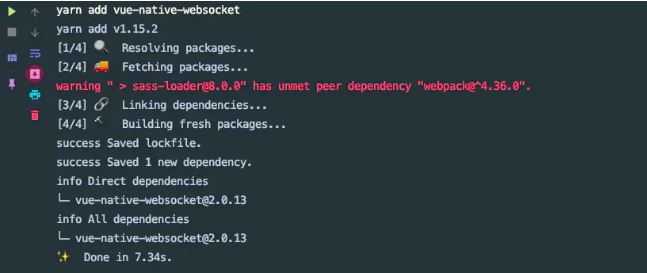Vue通过配置WebSocket并实现群聊功能
写JQuery项目时,使用websocket很简单,不用去考虑模块化,组件之间的访问问题,面向文档编程即可,在Vue项目中使用websocket时,远远没有想象中的那么简单,需要考虑很多场景,本篇文章将与各位开发者分享下 vue-native-websocket 库的使用以及配置,用其实现群聊功能。先看下最终实现的效果 。

安装依赖
本文中对于 vue-native-websocket 库的讲解,项目中配置了vuex,对其不了解的开发者请移步官方文档,如果选择继续阅读本篇文章会比较吃力。
vue-native-websocket安装
# yarn | npm 安装
yarn add vue-native-websocket | npm install vue-native-websocket --save
安装成功
配置插件
在 main.js 中进行导入
import VueNativeSock from 'vue-native-websocket'使用 VueNativeSock 插件,并进行相关配置
// main.js
// base.lkWebSocket为你服务端websocket地址
Vue.use(VueNativeSock,base.lkWebSocket,{
// 启用Vuex集成,store的值为你的vuex
store: store,
// 数据发送/接收使用使用json格式
format: "json",
// 开启自动重连
reconnection: true,
// 尝试重连的次数
reconnectionAttempts: 5,
// 重连间隔时间
reconnectionDelay: 3000,
// 将数据进行序列化,由于启用了json格式的数据传输这里需要进行重写
passToStoreHandler: function (eventName, event) {
if (!eventName.startsWith('SOCKET_')) { return }
let method = 'commit';
let target = eventName.toUpperCase();
let msg = event;
if (this.format === 'json' && event.data) {
msg = JSON.parse(event.data);
if (msg.mutation) {
target = [msg.namespace || '', msg.mutation].filter((e) => !!e).join('/');
} else if (msg.action) {
method = 'dispatch';
target = [msg.namespace || '', msg.action].filter((e) => !!e).join('/');
}
}
this.store[method](target, msg);
this.store.state.socket.message = msg;
}
});vuex的相关配置:mutations和actions添加相关函数
// vuex配置文件
import Vue from 'vue'
import Vuex from 'vuex'
Vue.use(Vuex);
export default new Vuex.Store({
state: {
token:"",
userID:"",
// 用户头像
profilePicture: "",
socket: {
// 连接状态
isConnected: false,
// 消息内容
message: '',
// 重新连接错误
reconnectError: false
}
},
mutations: {
SOCKET_ONOPEN (state, event) {
// 连接打开触发的函数
Vue.prototype.$socket = event.currentTarget;
state.socket.isConnected = true
},
SOCKET_ONCLOSE (state, event) {
// 连接关闭触发的函数
state.socket.isConnected = false;
console.log(event);
},
SOCKET_ONERROR (state, event) {
// 连接发生错误触发的函数
console.error(state, event)
},
SOCKET_ONMESSAGE (state, message) {
// 收到消息时触发的函数
state.socket.message = message
},
SOCKET_RECONNECT(state, count) {
// 重新连接触发的函数
console.info(state, count)
},
SOCKET_RECONNECT_ERROR(state) {
// 重新连接失败触发的函数
state.socket.reconnectError = true;
},
},
actions: {
customerAdded (context) {
// 新连接添加函数
console.log('action received: customerAdded');
console.log(context)
}
},
modules: {
}
})至此 vue-native-websocket 配置结束,如需了解更多配置方法,请移步 npm仓库。
使用插件并实现群聊
在消息发送接收组件中添加 onmessage 监听(mounted生命周期中)
// 监听消息接收
this.$options.sockets.onmessage = (res)=>{
// res.data为服务端返回的数据
const data = JSON.parse(res.data);
// 200为服务端连接建立成功时返回的状态码(此处根据真实后端返回值进行相应的修改)
if(data.code===200){
// 连接建立成功
console.log(data.msg);
}else{
// 获取服务端推送的消息
const msgObj = {
msg: data.msg,
avatarSrc: data.avatarSrc,
userID: data.userID
};
// 渲染页面:如果msgArray存在则转json
if(lodash.isEmpty(localStorage.getItem("msgArray"))){
this.renderPage([],msgObj,0);
}else{
this.renderPage(JSON.parse(localStorage.getItem("msgArray")),msgObj,0);
}
}
};实现消息发送
// 消息发送函数
sendMessage: function (event) {
if (event.keyCode === 13) {
// 阻止编辑框默认生成div事件
event.preventDefault();
let msgText = "";
// 获取输入框下的所有子元素
let allNodes = event.target.childNodes;
for(let item of allNodes){
// 判断当前元素是否为img元素
if(item.nodeName==="IMG"){
msgText += `/${item.alt}/`;
}
else{
// 获取text节点的值
if(item.nodeValue!==null){
msgText += item.nodeValue;
}
}
}
// 消息发送: 消息内容、状态码、当前登录用户的头像地址、用户id
this.$socket.sendObj({msg: msgText,code: 0,avatarSrc: this.$store.state.profilePicture,userID: this.$store.state.userID});
// 清空输入框中的内容
event.target.innerHTML = "";
}
}实现页面渲染
// 渲染页面函数
renderPage: function(msgArray,msgObj,status){
if(status===1){
// 页面第一次加载,如果本地存储中有数据则渲染至页面
let msgArray = [];
if(localStorage.getItem("msgArray")!==null){
msgArray = JSON.parse(localStorage.getItem("msgArray"));
for (let i = 0; i<msgArray.length;i++){
const thisSenderMessageObj = {
"msgText": msgArray[i].msg,
"msgId": i,
"avatarSrc": msgArray[i].avatarSrc,
"userID": msgArray[i].userID
};
// 解析并渲染
this.messageParsing(thisSenderMessageObj);
}
}
}else{
// 判断本地存储中是否有数据
if(localStorage.getItem("msgArray")===null){
// 新增记录
msgArray.push(msgObj);
localStorage.setItem("msgArray",JSON.stringify(msgArray));
for (let i = 0; i <msgArray.length; i++){
const thisSenderMessageObj = {
"msgText": msgArray[i].msg,
"msgId": i,
"avatarSrc": msgArray[i].avatarSrc,
"userID": msgArray[i].userID,
};
// 解析并渲染
this.messageParsing(thisSenderMessageObj);
}
}else{
// 更新记录
msgArray = JSON.parse(localStorage.getItem("msgArray"));
msgArray.push(msgObj);
localStorage.setItem("msgArray",JSON.stringify(msgArray));
const thisSenderMessageObj = {
"msgText": msgObj.msg,
"msgId": Date.now(),
"avatarSrc": msgObj.avatarSrc,
"userID": msgObj.userID
};
// 解析并渲染
this.messageParsing(thisSenderMessageObj);
}
}
}实现消息解析
// 消息解析
messageParsing: function(msgObj){
// 解析接口返回的数据进行渲染
let separateReg = /(\/[^/]+\/)/g;
let msgText = msgObj.msgText;
let finalMsgText = "";
// 将符合条件的字符串放到数组里
const resultArray = msgText.match(separateReg);
if(resultArray!==null){
for (let item of resultArray){
// 删除字符串中的/符号
item = item.replace(/\//g,"");
for (let emojiItem of this.emojiList){
// 判断捕获到的字符串与配置文件中的字符串是否相同
if(emojiItem.info === item){
const imgSrc = require(`../assets/img/emoji/${emojiItem.hover}`);
const imgTag = `<img src="${imgSrc}" width="28" height="28" alt="${item}">`;
// 替换匹配的字符串为img标签:全局替换
msgText = msgText.replace(new RegExp(`/${item}/`,'g'),imgTag);
}
}
}
finalMsgText = msgText;
}else{
finalMsgText = msgText;
}
msgObj.msgText = finalMsgText;
// 渲染页面
this.senderMessageList.push(msgObj);
// 修改滚动条位置
this.$nextTick(function () {
this.$refs.messagesContainer.scrollTop = this.$refs.messagesContainer.scrollHeight;
});
}DOM结构
通过每条消息的userID和vuex中的存储的当前用户的userID来判断当前消息是否为对方发送
<!--消息显示-->
<div class="messages-panel" ref="messagesContainer">
<div class="row-panel" v-for="item in senderMessageList" :key="item.msgId">
<!--发送者消息样式-->
<div class="sender-panel" v-if="item.userID===userID">
<!--消息-->
<div class="msg-body">
<!--消息尾巴-->
<div class="tail-panel">
<svg class="icon" aria-hidden="true">
<use xlink:href="#icon-zbds30duihuakuangyou" rel="external nofollow" ></use>
</svg>
</div>
<!--消息内容-->
<p v-html="item.msgText"/>
</div>
<!--头像-->
<div class="avatar-panel">
<img :src="item.avatarSrc" alt="">
</div>
</div>
<!--对方消息样式-->
<div class="otherSide-panel" v-else>
<!--头像-->
<div class="avatar-panel">
<img :src="item.avatarSrc" alt="">
</div>
<!--消息-->
<div class="msg-body">
<!--消息尾巴-->
<div class="tail-panel">
<svg class="icon" aria-hidden="true">
<use xlink:href="#icon-zbds30duihuakuangzuo" rel="external nofollow" ></use>
</svg>
</div>
<!--消息内容-->
<p v-html="item.msgText"/>
</div>
</div>
</div>
</div>当然,我们还有更方便快捷的在vue中使用websocket的方法,那就是使用GoEasy提供的websocket服务。
目前GoEasy提供完整的websocket前后端解决方案,简单的几行代码集成,即可快速搭建您的专属websocket服务。 同时支持各种前端技术框架如小程序、uniapp、vue,支持各种服务端语言如php、java、python等。对websocket有需求的开发者可以来注册试用一下【立即注册】